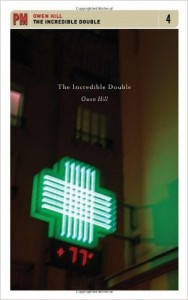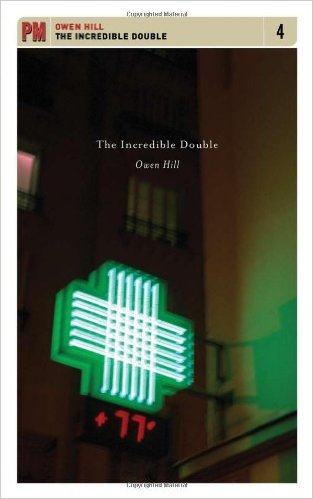 The Incredible Double
The Incredible Double
by Owen Hill
PM Press. 128 pages, $13.95
THERE’S A LOT that’s improbable in Owen Hill’s mystery novel, The Incredible Double. For starters, there’s the protagonist, Clay Blackburn, who makes his living buying and reselling used books in Berkeley, California, and moonlighting as an unlicensed private detective. Even with rent control, it seems like an untenable arrangement.
As for the actual mystery upon which the novel is built, it centers on a drugstore magnate, Jerry Wally, who’s not what he appears to be, and a far-reaching, international conspiracy involving politicians and celebrities. It sounds crazy, even for a mystery novel, but Hill brings it all together in a story that’s a delight to read. The only disappointment is that it’s such a slim book; one wants it to keep going.
The real strength of The Incredible Double, as with all the best mysteries, lies in its characters and milieus. In Clay Blackburn and his cohorts, Hill has created an immensely interesting and likable bunch. As Clay scouts for books among the city’s many used bookstores, he rubs shoulders with all manner of eccentrics, and his list of friends includes a cast of even more colorful characters, such as an aging hippie and Neil Young look-alike named Marvin and a six-foot Asian transsexual (MTF) ex-FBI agent named Bailey Dao. It would be fun to read about them even if they were just trying to negotiate their way out of some parking tickets.
Clay is the most improbable of private investigators for many reasons, not the least of which is his bisexuality. “The lover and beloved, the seducer and the seduced, I can play either end,” Clay reflects in the middle of his seduction of a mysterious woman named Grace. “I don’t have strong sexual prejudices, it’s all sex and I’ll sink into any role that gets me there. Usually, though, I require more time. I like to savor the persona I’ve chosen, or, rather, what the situation has called for.” Clay’s sexuality seems to be rooted in a worldview that’s heavily Zen, which he comes close to admitting, only to follow this observation with: “But I hate that Buddhist crap.”
Hill weaves Clay’s bisexuality into the tale in a manner that’s more titillating than anything. In this novel, at least, Clay gets more action from the females and only seems to admire men from afar, as if he’s content merely to entertain the idea of same-sex action but not do anything about it. There’s a hint, later on, that Clay is still recovering from a breakup with a boyfriend, but this is not explained. Clay isn’t the only one with somewhat fluid sexuality. In a later scene, as Bailey Dao changes into a swimsuit in a hotel room in front of Clay and Marvin, the latter confides, upon beholding Dao’s extraordinary and still androgynous physique, “I used to think I was totally straight. I’d make an exception for Bailey.”
It’s no mistake that Clay lives in a Berkeley building named the Chandler Apartments: as it happens, The Chandler Apartments is Hill’s well-received 2002 novel in which Clay Blackburn makes his debut. Raymond Chandler’s Philip Marlowe haunts this novel, and in case readers don’t pick that up from the narrative voice or the name of Clay’s building, Hill has another character drop Marlowe’s name, later in the story, just for good measure.
Clay is among the more literary of private detectives. In addition to his book dealing, he’s a poet who worships Black Mountain poet legend Ed Dorn. He even uses Dorn’s magnum opus Gunslinger like the Bible or the I Ching, opening pages at random for spiritual guidance whenever he finds himself in a quandary. He attends local author events religiously, lamenting the endangered state of the independent bookseller. He takes literary potshots whenever he can. For example, on entering Grace’s apartment, he immediately scans her bookshelves and notes: “No McSweeney’s, no Paul Auster. I felt relieved.” Later, when taking Grace to a poetry reading, he asks her, “Is this your first?” and she answers, “I saw Robert Pinsky in college,” to which Clay replies, “Then it is your first.”
With the help of his cohorts and an army of homeless informers, Clay uncovers the truth about Jerry Wally and his organization, finds love (or at least satisfying sex) in the process, and establishes himself as a bona fide private eye. In creating such an interesting cast of characters and throwing them together in the improbable adventure that is The Incredible Double, Hill seems to have established himself as mystery writer worth watching.






